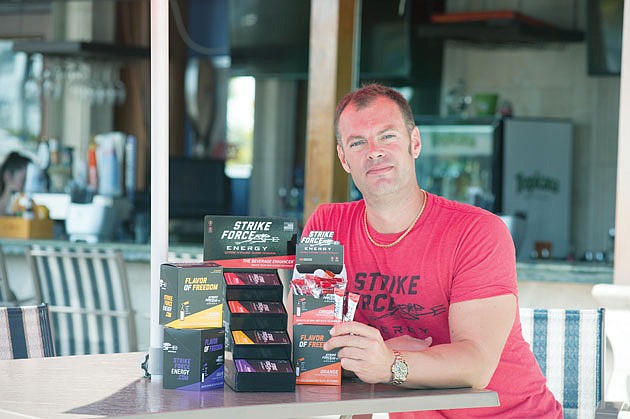- November 23, 2024
-
-
Loading

Loading

One day, when he was eating a hot dog at a gas station, Bruce Schlee looked down at a packet of ketchup and got an idea.
What if he could store flavor in a similar packet and use it to make an energy drink?
Schlee shelved the idea in 2011 to pursue other entrepreneurial ventures. Then, when working with Sean Matson and Zach Steinbock on another company, he told them about his energy packet idea. They were both active members of the military, and they liked the concept. It was an opportunity to get his idea going.
Four years later, Schlee, based in Manatee County, is on the cusp of a major breakthrough in a crowded field: energy drinks. His company, Strike Force Beverage, is on track to do $2 million in sales in 2017, and he projects big expansion in distribution in 2018.
Schlee's success stems from a trifecta of listening well to targeted customers, finding an underserved niche and a relentless push on social media.
In the early stages of developing the drink, Schlee talked to members of the military about what was important to them in an energy drink. He learned they didn't want something that would cause them to crash after drinking it or something that would make them shaky.
Schlee worked with his uncle, a chemist, on a formula for the drink. They looked at the chemical makeup of other energy drinks, and what they came up with, he says, is a powder without the side effects some other energy drinks have, like sugar crashes.
Dubbed Strike Force Energy, the drink comes in four flavors — original, grape, orange and lemon — and can be added to a variety of beverages, including water, iced tea, lemonade and sports drinks. Each packet is designed to flavor 16.9 ounces, a standard water bottle size. The ability to flavor water was important, Schlee says, because water doesn't taste good in some areas where the military is operating.
The packets also address a problem the beverage world typically faces, Schlee says — that companies “can only ship so far because it's not profitable” because of the size and weight of liquids in cans and bottles. In that way, the small, lightweight and portable Strike Force Energy packets are “logistically superior to other beverages,” he says.
Schlee started production on Strike Force Energy in January 2016. An early $10,000 order from a company with a subscription box service helped it get off to a good start.
Strike Force Beverage is based in Palmetto in a 7,000-square-foot office that's home to all aspects of production, including handling raw materials and order fulfillment.
Matson and Steinbock are involved in the business, and altogether, Schlee has 10 people working for the company. All but three (Schlee and two others) are veterans.
He says the company sells primarily to the U.S. military and foreign and allied militaries. He also says Strike Force Energy is used by special operations forces worldwide. “We really target marketed the military,” says Schlee. “It's a group that's not marketed to hard.”
Strike Force has gotten the word out about the product by sponsoring podcasts, placing advertisements and contributing to events and military charities.
Word of mouth and social media also have been key, Schlee says. Social media is the “primary vehicle for getting our brand out there,” he says. “It's cheap and highly effective. If we drop the right social media post, it's worth $50,000.”
Because of the company's growth, Schlee is seeking larger office space, in Sarasota or Manatee. Strike Force Energy also just launched sales in several 7-Eleven stores in Virginia Beach and South Florida. There, the packets are sold for $1.19 each. Schlee says more stores are in line to carry the product, too.
“It's our customers pulling the product into stores, not us pushing it onto the shelves,” he says. “I want to be in every gas station and grocery store. I want to be everywhere Coca-Cola is. I want to be a global beverage company.”